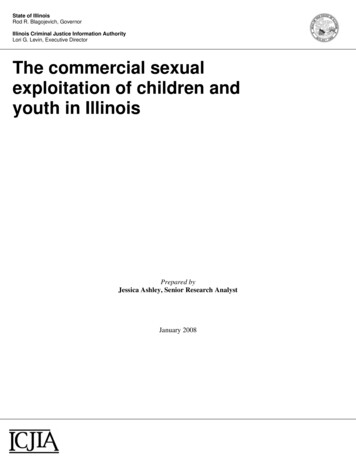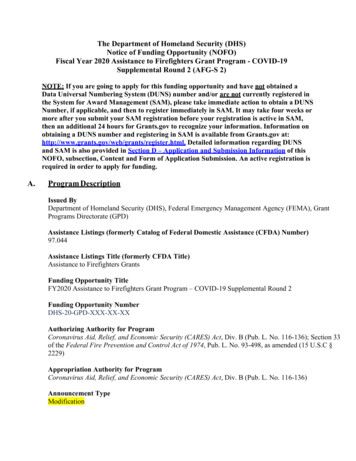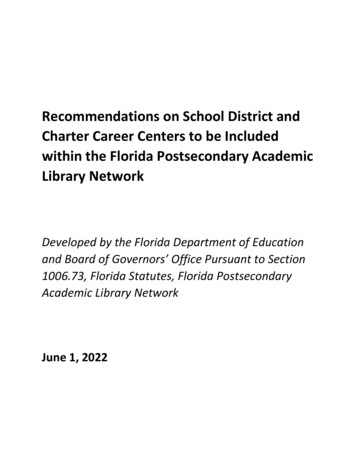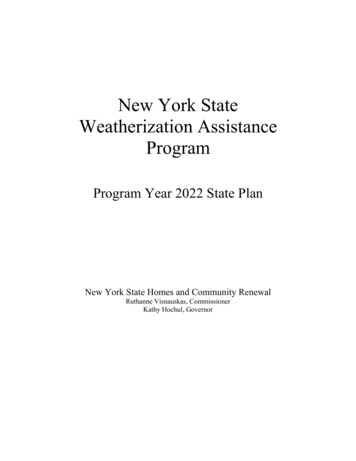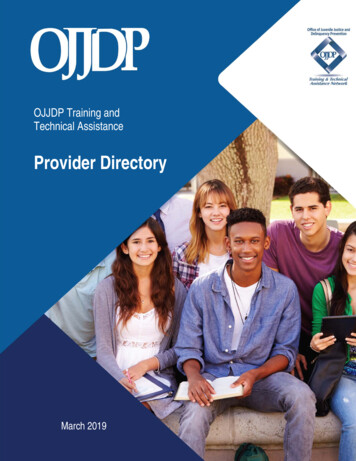
Transcription
OJJDP Training andTechnical AssistanceProvider DirectoryMarch 2019
ContentsAbout the Directory . 1Forward . 2COMMUNICATIONS AND COORDINATION DIVISION . 3Bixal. 3Concentration of Federal Efforts Resource Center . 3ICF . 4Office of Juvenile Justice and Delinquency Prevention’s (OJJDP) National Training and TechnicalAssistance Center . 5John Jay College of Criminal Justice . 6National Initiative for Building Community Trust and Justice . 7INTERVENTION DIVISION . 8Children and Family Futures. 8Family Drug Court Training and Technical Assistance Program . 8Children’s Hospitals and Clinics of Minnesota . 10Midwest Regional Children's Advocacy Center . 10Crime & Justice Institute at Community Resources for Justice . 11Juvenile Justice System Improvement: A Comprehensive Strategy to Juvenile Justice SystemImprovement Initiative . 11Juvenile Justice Systemwide Improvement and Reinvestment Initiative . 12The Council of State Governments – Justice Center . 13Smart on Juvenile Justice: Community Supervision Training and Technical Assistance Program . 14Smart on Juvenile Justice: Statewide Juvenile Justice Planning Training and Technical AssistanceProgram . 15ICF . 16Office of Juvenile Justice and Delinquency Prevention (OJJDP) Juvenile Justice Systems ReformPromising Practices . 16Institute for Intergovernmental Research . 17Opioid Affected Youth Initiative Technical Assistance . 17Justice Programs Office at American University – School of Public Affairs . 18Juvenile Drug Treatment Court Training and Technical Assistance Initiative . 19The National Council of Juvenile and Family Court Judges . 20Creating Juvenile Drug Courts Communities of Practice: Sharing Information Across Courts toImprove Practice . 20Office of Juvenile Justice and Delinquency Prevention Training and Technical Assistance Provider Directoryi
The National Crittenton Foundation. 21National Girls Initiative . 21National Juvenile Defender Center . 22Enhancing Youth Access to Justice . 23National Native Children’s Trauma Center . 24Office of Juvenile Justice and Delinquency Prevention Defending Childhood 2016 AmericanIndian/Alaska Native Policy Initiative Training and Technical Assistance . 24Pacific Juvenile Defender Center . 25Juvenile Defender Resource Project . 25Performance-Based Standards Learning Institute, Inc. . 26Improving Juvenile Reentry Programs’ Data Collection, Analysis, and Reporting . 26The Philadelphia Children’s Alliance . 27Northeast Regional Children’s Advocacy Center . 27Robert F. Kennedy National Resource Center for Juvenile Justice . 28Second Chance Act: Community Supervision Review and Enhancement Training and TechnicalAssistance Project. 29Rural Alaska Community Action Program, Inc. . 30The Resource Basket—Alaska Native Youth Provider Network and Community Connection . 30Tribal Law and Policy Institute . 31Tribal Youth Program Resource Center (TYPRC) . 31United National Indian Tribal Youth, Inc. (UNITY). 32Tribal Youth Leadership Development Initiative . 32University of Oklahoma Health Sciences Center . 33OJJDP Tribal Youth Training and Technical Assistance Center . 34SPECIAL VICTIMS AND VIOLENT OFFENDERS DIVISION . 36Association of Prosecuting Attorneys . 36Child Abuse Prosecution Project . 36Chadwick Center for Children and Families at Rady Children’s Hospital-San Diego . 37Western Regional Children’s Advocacy Center . 38Fox Valley Technical College. 39AMBER Alert Training and Technical Assistance Program . 39Internet Crimes Against Children Task Force National Training Program, Category 1: Entry Level andCore Training . 40Internet Crimes Against Children Task Force National Training Program, Category 3: SpecializedTraining on Tools and Technology . 41Office of Juvenile Justice and Delinquency Prevention Training and Technical Assistance Provider Directoryii
Internet Crimes Against Children Task Force Program Support. 41Missing and Exploited Children Training and Technical Assistance Program . 42Institute for Intergovernmental Research . 43The National Gang Center . 44International Association of Chiefs of Police . 45Changing Minds: Law Enforcement's Role in Addressing Children Exposed to Violence and ChildhoodTrauma Initiative . 45MENTOR: The National Mentoring Partnership, Inc. . 46National Mentoring Resource Center . 47National Center for Missing & Exploited Children. 48National Center for Missing & Exploited Children National Resource Center and InformationClearinghouse . 48National Center for Missing & Exploited Children National Resource Center and InformationClearinghouse–USSS–IAA . 49National Children’s Advocacy Center . 49Southern Regional Children’s Advocacy Center . 50Training and Technical Assistance for Child Abuse Professionals: National Children’s Advocacy CenterChild Abuse Response Enhancement (CARE) Program . 51National Children’s Alliance . 52Victims of Child Abuse Children's Advocacy Centers Membership and Accreditation Program . 52Victims of Child Abuse Act Children’s Advocacy Centers Sub-Grant Program . 53Victims of Child Abuse Act Children’s Advocacy Centers Sub-Grant Program—Domestic Victims ofTrafficking Fund . 54The National Council of Juvenile and Family Court Judges . 55Child Abuse Training for Judicial Court Personnel . 55The National Court Appointed Special Advocate Association . 56National CASA Association Training, Technical Assistance, and Membership Programs . 56National White Collar Crime Center . 57NW3C Digital Evidence Forensics–Internet Crimes Against Children (ICAC) Task Force NationalTraining Program . 58SEARCH Group, Incorporated . 59Internet Crimes Against Children Task Force National Training Program: Digital Evidence Forensics 59Internet Crimes Against Children Task Force National Training Program: Specialized Training on Toolsand Technology . 60Office of Juvenile Justice and Delinquency Prevention Training and Technical Assistance Provider Directoryiii
The Innocent Justice Foundation . 60SHIFT (Supporting Heroes in Mental Health Foundational Training) . 61University of Oklahoma Health Sciences Center . 62National Center on the Sexual Behavior of Youth . 62Youth Collaboratory . 63Mentoring for Child Victims of Commercial Sexual Exploitation and Domestic Minor Sex TraffickingInitiative Training and Technical Assistance . 64STATE RELATIONS AND ASSISTANCE DIVISION . 66American Institutes for Research . 66Center for Coordinated Assistance to States . 66Center for Children’s Law and Policy, Inc. . 67Technical Assistance to End Racial and Ethnic Disparities (RED) in the Juvenile Justice System . 67TTA Providers and Projects Index . 69TTA Areas Index . 72Office of Juvenile Justice and Delinquency Prevention Training and Technical Assistance Provider Directoryiv
About the DirectoryThis directory is organized by listing training and technical assistance (TTA) providers and projects underthe Office of Juvenile Justice and Delinquency Prevention (OJJDP) divisions that administer thoseprojects. The divisions are Budget, Communications and Coordination, Intervention, Special Victims andViolent Offenders, and State Relations and Assistance.For your convenience, project descriptions include icons to illustrate alignment. The index includes a listof providers in alphabetical order, and lists projects according to TTA areas.If you need assistance reaching the correct contact person for any OJJDP-supported TTA project, pleasecontact OJJDP’s National Training and Technical Assistance Center (NTTAC).Call OJJDP’s TTA Help Desk at 1-833-647-0513 oremail your request to ojjdptta@usdoj.govOffice of Juvenile Justice and Delinquency Prevention Training and Technical Assistance Provider Directory1
ForwardThe Juvenile Justice and Delinquency Prevention Act of 1974 (JJDP Act) authorized the creation of theOffice of Juvenile Justice and Delinquency Prevention (OJJDP) and recognizes the central role of trainingand technical assistance (TTA) in the national effort to reduce youth crime and improve the juvenilejustice system. Section 244 of the JJDP Act authorizes OJJDP to undertake TTA related to: Planning and developing juvenile delinquency programs. Professionals and volunteers working with high-risk and delinquent youth and their families. Techniques and methods proven effective in preventing and treating juvenile delinquency. Jurisdictional teams that assist state and local agencies working directly with high-risk anddelinquent youth.OJJDP provides TTA services to thousands of practitioners, policymakers, and other stakeholders eachyear. These services include online and classroom training, webinars, TTA toolkits, resource guides andother publications, supporting conferences that help practitioners across the nation understand andadopt best practices in their work, and onsite TTA to help grantees and other stakeholders improvepractices and processes. OJJDP operates the National Training and Technical Assistance Center (OJJDP’sNTTAC) as a primary resource for helping the Field access the full array of OJJDP’s TTA resources andservices.OJJDP’s TTA services are unique because of the quality of its providers, their wide range of expertise,and their willingness to collaborate to get much-needed resources to the field. Various organizationsmanage numerous OJJDP TTA projects across the nation. The services they provide are highlighted inthis directory and are making a positive difference each day in the lives of our youth.OJJDP TTA TeamOffice of Juvenile Justice and Delinquency Prevention Training and Technical Assistance Provider Directory2
COMMUNICATIONS AND COORDINATION DIVISIONThe Communications and Coordination Division manages the Office’s communications, training andtechnical assistance, and grants coordination functions. The division also oversees the activities of theFederal Advisory Committee on Juvenile Justice and the Coordinating Council on Juvenile Justice andDelinquency Prevention.TTA Provider OrganizationBixalBixal is a small business helping government agencies engage the public and hard-to-reachcommunities with strategic communications and sophisticated technologies.Core Capabilities: Strategic communications, outreach, and event planning: Developing effective, research-drivencommunications strategies, and managing seamless virtual and in-person meetings and events. Web and mobile development: Designing and developing dynamic platforms to support forwardthinking communications strategies. Knowledge management and training: Helping organizations unearth, organize, expand, and sharetheir intellectual capital. Program management: Providing the right resources to ensure that organizations can achieve theirgoals on time and on budget using the most efficient and innovative approaches.TTA Project ProfileConcentration of Federal Efforts Resource CenterOverview: The Concentration of Federal Efforts (CFE) Program supports the workof and manages two Federal Advisory Committees (FAC) to the Office of JuvenileJustice and Delinquency Prevention (OJJDP), the Coordinating Council on JuvenileJustice and Delinquency Prevention, and the Federal Advisory Committee onJuvenile Justice. The CFE Program manages the development of objectives,priorities, and long-term strategic and program plans, and the implementation ofthe overall policy and strategies.Services: The CFE Resource Center provides: Both on-and offsite knowledge management (including strategic andconsultative services; research, writing and editorial functions; and informationcollection, analysis, and synthesis). Technical services (including web development and maintenance). Logistical and administrative meeting and conference support services(including subcommittee support and public FAC meetings).Office of Juvenile Justice and Delinquency Prevention Training and Technical Assistance Provider Directory3
Products: For the CFE Resource Center, Bixal provides: FAC meeting management and meeting summaries, briefing papers, andresource materials. FAC committee and subcommittee research and work products development. Web development, content strategy, and site maintenance for two FACwebsites.Audience: Community Members, Compliance Monitors, Court Personnel,Defenders, DMC Coordinators, Detention/Corrections Staff, Faith-BasedOrganizations, Families, Juvenile Justice Specialists, Law Enforcement, MentalHealth Professionals, Mentoring Professionals, Nonprofit Organizations, Parole,Probation Officers, Prosecutors, School Personnel, Social Services, State AdvisoryGroups, Students, Substance Abuse Professionals, Tribal Community, Volunteers,Youth, Youth Advocates, Youth Services Professionals, Transportation.Eligibility: OJJDP staff, Concentration of Federal Efforts program, members of theCoordinating Council on Juvenile Justice and Delinquency Prevention, andmembers of the Federal Advisory Committee on Juvenile Justice.Website: www.bixal.comContact Information:Mary Kay AlegreProject Directormarykay.alegre@bixal.com703-634-57013050 Chain Bridge Road, Suite 420Fairfax, VA 22030TTA Provider OrganizationICFICF partners with government and commercial clients to deliver professional services and technologysolutions in the health, social programs, public safety, consumer/financial, energy, environment,infrastructure, and defense markets. ICF partners with its clients to conceive and implement solutionsand services that protect and improve the quality of life and takes pride in providing lasting solutionsto society's most challenging management, technology, and policy issues.Office of Juvenile Justice and Delinquency Prevention Training and Technical Assistance Provider Directory4
TTA Project ProfileOffice of Juvenile Justice and Delinquency Prevention’s (OJJDP) NationalTraining and Technical Assistance CenterOverview: OJJDP’s National Training and Technical Assistance Center (NTTAC)serves as the principal coordinator, broker, and facilitator for all of OJJDP’s TTAresources and services by: Strategically aligning and connecting OJJDP’s TTA providers with OJJDPgrantees and practitioners seeking assistance. Supporting Communities of Practice focused on building, retaining, andsharing juvenile justice and child victimization prevention knowledge. Enhancing OJJDP’s efforts to lead and facilitate national juvenile justiceimprovement and child victimization prevention efforts.Services: Specific services that OJJDP’s NTTAC provides include: Coordinating the delivery of OJJDP’s TTA by making appropriate referrals andensuring that requests are handled efficiently through the use of OJJDP’sTTA360 online TTA request and management system. Maintaining a customer-friendly TTA Help Desk for professionals and otherswho are interested in juvenile justice and child victimization issues. HelpDesk staff locate resources, assist with access to technology platforms,compile guidance documents for TTA professionals and the field, makereferrals, and provide other services to meet requesters’ needs. The HelpDesk is accessible by phone and e-mail. Providing sophisticated virtual-learning and information-sharing platformsand technical expertise to support OJJDP and its TTA Provider Networkprojects in delivering virtual training and supporting Communities ofPractice. Assisting OJJDP and its TTA Provider Network with communications,outreach, and marketing activities by making accessible to the public thenumerous trainings, resources, and upcoming events produced by OJJDP’sTTA providers and partners. This includes dissemination vehicles such asOJJDP’s website; NTTAC’s YouTube page; the OJJDP TTA E-News and listservmessages (disseminated to an audience of approximately 29,000practitioners and other stakeholders); and a TTA Network Facebook pagefeaturing content from OJJDP, TTA providers from the Network, and otherprofessionals.Products: Webinars including recordings, transcripts, and related resourcematerials; online training courses; the OJJDP Training and Technical AssistanceProvider Directory; OJJDP Core Performance Standards: Best Practices for TTA;OJJDP Core Performance Standards: Provider Requirements; and the TTAe-newsletter.Audience: Child Protection and Advocacy Professionals, Child WelfarePersonnel, Community Members, Compliance Monitors, Court Personnel,Defenders, DMC Coordinators, Detention/Corrections Staff, Faith-BasedOrganizations, Families, Juvenile Justice Specialists, Law Enforcement, MentalOffice of Juvenile Justice and Delinquency Prevention Training and Technical Assistance Provider Directory5
Health Professionals, Mentoring Professionals, Nonprofit Organizations,Aftercare/Parole/Re-entry, Probation Officers, Prosecutors, School Personnel,Social Services, State Advisory Groups, Students, Substance Abuse Professionals,Tribal Community, Volunteers, Youth, Youth Advocates, Youth ServicesProfessionals.Eligibility: Juvenile justice, delinquency prevention and child victimizationprevention practitioners, TTA providers, researchers, policymakers, and thepublic. Contact the project to learn more about TTA available from OJJDP’snetwork of TTA providers, and for information about services available to OJJDPTTA providers.Website: https://www.ojjdp.gov/programs/tta.htmlContact Information:Francis Mendez, J.D., MSWfmendez@nttac.org703-225-23919300 Lee HighwayFairfax, VA 22031OJJDP TTA Help Deskojjdptta@usdoj.gov833-647-0513OJJDP’s NTTACAttn: Operations Team9300 Lee HighwayFairfax, VA 22031TTA Provider OrganizationJohn Jay College of Criminal JusticeAn international leader in educating for justice, John Jay College of Criminal Justice of The City Universityof New York offers a rich liberal arts and professional studies curriculum to upwards of 15,000undergraduate and graduate students from more than 135 nations. In teaching, scholarship, andresearch, the College approaches justice as an applied art and science in service to society and as anongoing conversation about fundamental human desires for fairness, equality, and the rule of law.Office of Juvenile Justice and Delinquency Prevention Training and Technical Assistance Provider Directory6
TTA Project ProfileNational Initiative for Building Community Trust and JusticeOverview: The National Initiative for Building Community Trust and Justice is designedto improve relationships and increase trust between communities and the criminaljustice system. In September 2014, the Department of Justice awarded the NationalNetwork for Safe Communities, through John Jay College of Criminal Justice, a 3-year, 5.75-million grant to launch the National Initiative. The National Initiative highlightsthree areas that hold great promise for concrete, rapid progress: implicit bias,procedural justice, and reconciliation. The initiative combines existing and newlydeveloped interventions informed by these ideas in six pilot sites: Birmingham, AL;Fort Worth, TX; Gary, IN; Minneapolis, MN; Pittsburgh, PA; and Stockton, CA. It is alsodeveloping interventions for victims of violence and other crimes, youth, and theLGBTQI community, as well as conducting research and evaluations.Services and Products: The National Initiative highlights three areas that hold greatpromise for concrete, rapid progress: Reconciliation facilitates frank conversations between communities and lawenforcement that allow them to address historic tensions, grievances, andmisconceptions between them and reset relationships. Procedural justice focuses on how the characteristics of law enforcementinteractions with the public shape the public’s views of the police, theirwillingness to obey the law, and actual crime rates. Implicit bias focuses on how largely unconscious psychological processes canshape authorities’ actions and lead to racially disparate outcomes even whereactual racism is not present.The National Initiative combines existing and newly developed interventions informedby these ideas in six pilot sites around the country. It also develops and implementsinterventions for victims of domestic violence and other crimes, youth, and theLGBTQI community; conducts research and evaluations; and maintains a nationalclearinghouse where information, research, and technical assistance are readilyaccessible for law enforcement, criminal justice practitioners, and community leaders.The initiative is guided by a board of advisors that includes national leaders from lawenforcement, academia, and faith-based groups, as well as community stakeholdersand civil rights advocates.Audience: Community Members, Faith-Based Organizations, Juvenile JusticeSpecialists, Law Enforcement, Probation Officers, Prosecutors, School Personnel,Social Services, Students, Tribal Community, Youth, Youth Advocates.Eligibility: Contact the project for more information.Website: https://trustandjustice.org/Contact Information:Rachel TeicherProject Directorrteicher@jjay.cuny.edu212-393-6356500 W. 56th Street, Suite 031WNew York, NY 10019Office of Juvenile Justice and Delinquency Prevention Training and Technical Assistance Provider Directory7
INTERVENTION DIVISIONThe Intervention Division administers nontraditional programs that are geared toward keeping youthfrom moving deeper into the court system. The division oversees OJJDP's work in the areas of diversionprogramming, drug courts, opioid abuse, community supervision, corrections, and reentry, amongother programs and initiatives.TTA Provider OrganizationChildren and Family FuturesChildren and Family Futures’ (CFF) mission is to improve the safety, permanency, well-being, andrecovery outcomes for childr
John Jay College of Criminal Justice . University of Oklahoma Health Sciences Center . (OJJDP) and recognizes the central role of training and technical assistance (TTA) in the national effort to reduce youth crime and improve the juvenile justice system. Section 244 of the JJDP Act authorizes OJJDP to undertake TTA related to:
